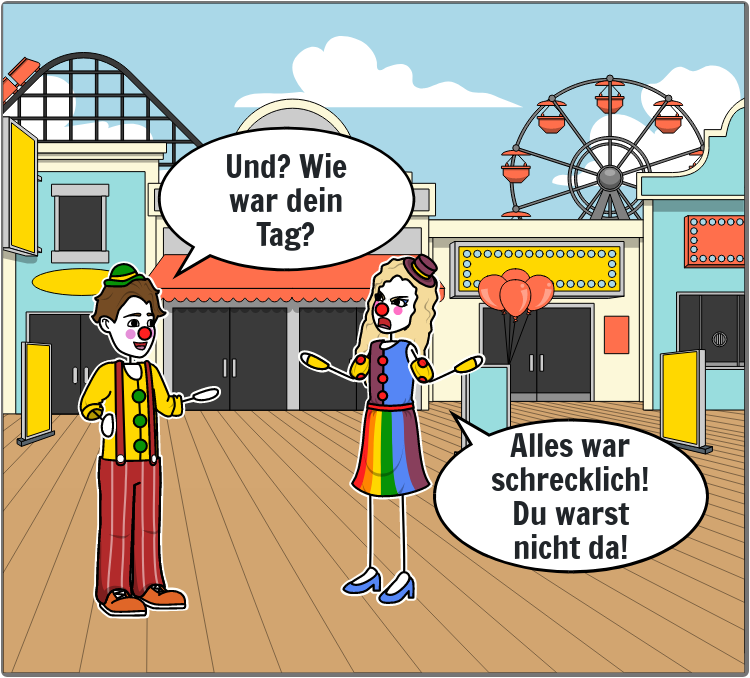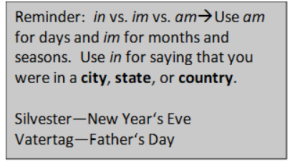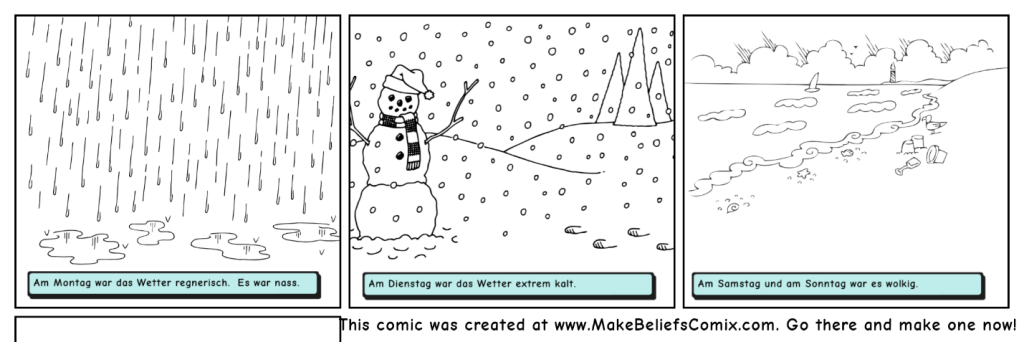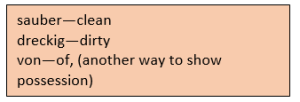2 Section 4-2: Simple past of “sein”
4.2: Simple past of “sein”
In Chapter 1, you learned how to conjugate the irregular verb sein, to be, in the present tense; go here to review it.
The simple past conjugation of sein is also irregular, but it looks closer to the simple past in English.
Simple past (Präteritum) of sein.

- Each form of the simple past of sein begins with “w,” just like English “was” and “were.”
- Ich and er/sie/es DO NOT have any endings. Other than that, all forms have the same endings that they do in regular present tense verbs. (In GR 201, you will learn more simple past forms of verbs that have this same pattern.)

Beispiele:
Ich war sehr krank letzte Woche.
Wo warst du gestern?
Er war neulich im Kino.
War die Katze draußen?
Das Buch war nicht so interessant.
Wir waren letzten Sommer in Schweden.
Ihr wart am Donnerstag zu Hause.
Oma und Opa waren am Sonntag zu Besuch.
Frau Scholz, waren Sie gestern im Supermarkt?
Notice that the verb still comes in second position in statements and questions that begin with question words.
Er war neulich im Kino. (He was at the movies recently.)
Wo warst du gestern? (Where were you?)
And notice that the verb still comes first when asking a yes/no question. (Just like in English.)
War die Katze draußen? (Was the cat outside?)

Video. Click to see me reteaching this.
Ex. B: Wo warst du am Freitag? Ask your classmates where they were at the following times. Use complete sentences.
Beispiel: am Freitag
A: Wo warst du am Freitag?
B: Ich war in Vermont.
- letzten Sommer

- im Dezember
- im Herbst
- im April
- am Sonntag
- am Vatertag
- am Silvester
- im Frühling
- am Montag

Ex. C: Wie war das Wetter am Montag? Beantworten Sie die Fragen in ganzen Sätzen.
Beispiel: Mittwoch
A: Wie war das Wetter am Mittwoch?
B: Es war kühl und regnerisch.

- Montag
- Dienstag
- Donnerstag
- Freitag
- Samstag
- Sonntag
Ex. D: Wie war Biologie? Beschreiben Sie die Kurse, die Sie letztes Semester belegt haben. (Using the simple past of sein, describe the courses that you took last semester.)
Beispiel: Physik
→Physik war schwierig aber interessant.
- Biologie
- Psychologie
- Englisch
- Kunst
- Musik
- Deutsch
- Chemie
- Mathe
Ex. E: In der Mensa. Watch Deutsch im Blick’s video about which foods are served when in a university cafeteria. War Ihre Mensa auch so flexibel?
EXTRA PRACTICE: Go to Germanzone.org’s website to do extra practice with the simple past of sein. The website will grade your answers.
- https://www.germanzone.org/verb-sein-simple-past-tense-1/
- https://www.germanzone.org/verb-sein-simple-past-tense-2/
Deutsche Musik. Listen to Johannes Oerding’s song, Einfach nur weg (2013), to hear examples of sein in the simple past.
Text: https://genius.com/Johannes-oerding-einfach-nur-weg-lyrics
Ex. E: Nicos Weg. Episode 28: Unser Haus. Watch episode 28 and do the online activities. You will review possessive adjectives, which you learned in Chapter 1.
https://learngerman.dw.com/en/unser-haus/l-37439097
Ex. F: Nicos Weg. Episode 29: Emmas Tag. Watch episode 29 and do the online activities. You will review how to tell time, which you learned in Chapters 2 and 3, and how to make a question using question words.
https://learngerman.dw.com/en/emmas-tag/l-37442425

